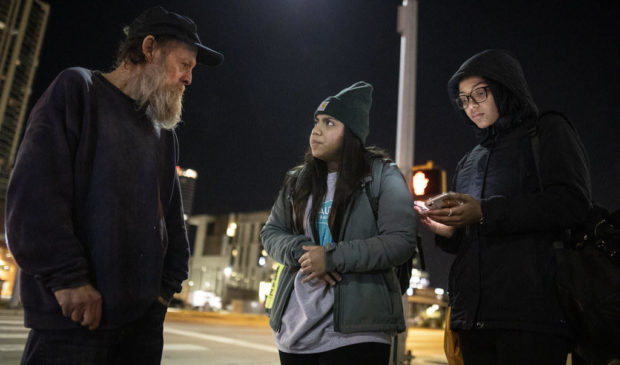Photo by Julia Reihs/KUT. Gladys Lopez (center) interviews James Harrison Jennings, as Leigh Miller records his answers on an app during Austin's annual point-in-time count.
Austin sees 10-year high in the number of people experiencing homelessness
Wednesday, May 20, 2020 by
Andrew Weber, KUT The number of people experiencing homelessness in Austin hit a 10-year high in 2020, according to a new report.
Data from the Ending Community Homelessness Coalition’s point-in-time count show that 2,506 people were homeless on the night of the annual census, Jan. 25. More than half of them – 1,574 – were on the street that night, an increase of 45 percent over last year.
ECHO attributes the increase to the city’s paring down of shelter beds overall – opting to focus more on transitional housing – and to the fact that the Salvation Army’s downtown shelter, which can house roughly 240 people, was closed that night because of a burst pipe.
As far as the overall number of homeless Austinites, ECHO says the city has seen a relatively unchanged growth rate per capita over those 10 years.
The survey also showed small increases among populations that had been targeted for re-housing efforts, specifically black Austinites, veterans and young people. ECHO noted fewer people among those demographics sought services last year.
Other metrics stayed relatively in line with previous years.
Black people are still overrepresented proportionately within the homeless community. While they make up roughly 8 percent of the city’s population, 36.5 percent of those surveyed in January identified as black. White people were also disproportionately represented, though not as much.
Quiana Fisher, a program manager at Caritas of Austin and co-chair of ECHO’s racial equity task group, said she hopes the city more adequately addresses that overrepresentation.
“Where we put our energy is where we see movement,” she said in a statement. “I would like to challenge us – service providers, decision-makers, the community and system at large – not just to talk but to act, to move past the equality lens and move toward providing real equity in housing services.”
The survey also showed that most people experiencing homelessness in the area are not here from out of state. Most of those surveyed told volunteers they first became homeless in Austin – 63 percent, a slight increase over 2018 – or in Texas –19.4 percent. Seventeen percent said they’d first experienced homelessness out of state.
The count capped off a politically charged year surrounding the issue.
In June 2019, the Austin City Council voted essentially to decriminalize camping and resting in public, which opponents argued made the downtown area less safe.
Mayor Steve Adler and other proponents of the decision argued it allowed people to become more visible. Opponents argued it led to more public health and safety issues in Central Austin and in other reaches of the city, as encampments cropped up following the decision.
The dispute triggered a back-and-forth between local and state leaders after Gov. Greg Abbott joined the discussion in October. Abbott threatened state intervention if the city didn’t address public defecation and drug use, citing (sometimes incorrectly) evidence from social media.
City Council did eventually reinstate some bans on public camping and resting, specifically in the downtown area. A day later, Abbott ordered the Texas Department of Transportation to clear underpasses of encampments.
Abbott then reappropriated state-owned land just south of the airport to serve as a temporary camp until a shelter could be built downtown.
Meanwhile, the city spent a record share of its budget on combating homelessness and worked with ECHO to find hotels to house people without medical conditions.
Now Covid-19 has brought a whole new set of complications for those experiencing homelessness. One analysis of unemployment data suggests the economic uncertainty caused by the pandemic could lead to a 45 percent increase in homelessness nationwide.
ECHO Executive Director Matt Mollica argued (as other homeless advocates have) that housing is as integral to well-being as access to health care.
“The Covid-19 pandemic illustrates more than ever that housing is a health care intervention and why we need to scale up permanent housing resources to meet current and future needs in our community,” he said.
This story was produced as part of the Austin Monitor’s reporting partnership with KUT.
The Austin Monitor’s work is made possible by donations from the community. Though our reporting covers donors from time to time, we are careful to keep business and editorial efforts separate while maintaining transparency. A complete list of donors is available here, and our code of ethics is explained here.
You're a community leader
And we’re honored you look to us for serious, in-depth news. You know a strong community needs local and dedicated watchdog reporting. We’re here for you and that won’t change. Now will you take the powerful next step and support our nonprofit news organization?









